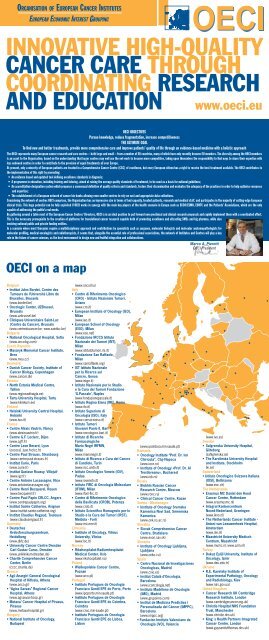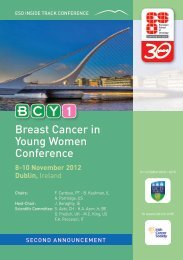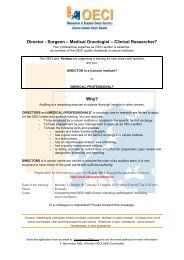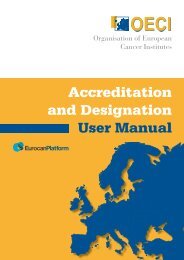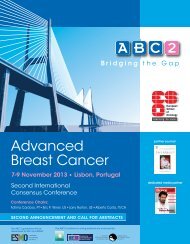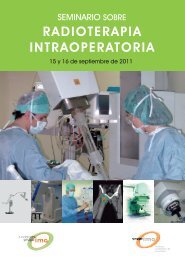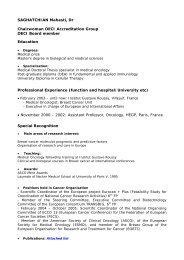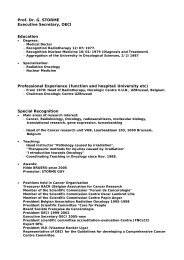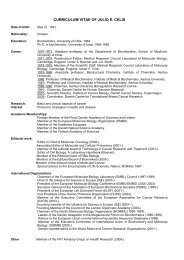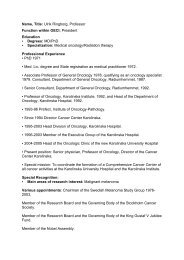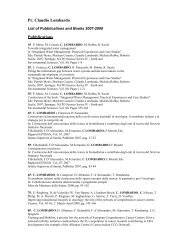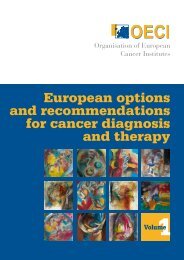OECI-Leaflet
OECI-Leaflet
OECI-Leaflet
You also want an ePaper? Increase the reach of your titles
YUMPU automatically turns print PDFs into web optimized ePapers that Google loves.
INNOVATIVE HIGH-QUALITY<br />
CANCER CARE through<br />
Coordinating Research<br />
and Education www.oeci.eu<br />
<strong>OECI</strong> OBJECTIVES<br />
Pursue knowledge, reduce fragmentation, increase competitiveness<br />
THE ULTIMATE GOAL<br />
To find new and better treatments, provide more comprehensive care and improve patients’ quality of life through an evidence-based medicine with a holistic approach<br />
The <strong>OECI</strong> represents many European cancer research and care centres – both large and small – from a number of EU countries, many of which have only recently become EU members. The diversity among the <strong>OECI</strong> members<br />
is an asset to the Organisation, based on the understanding that larger centres may well use the net-work to become more competitive, taking upon themselves the responsibility to find ways to share their expertise with<br />
less endowed centres in order to contribute to the provision of equal treatments all over Europe.<br />
At present, only a minority of European patients are treated in a Comprehensive Cancer Centre (CCC) of excellence, but every European citizen has a right to receive the best treatment available. The <strong>OECI</strong> contributes to<br />
the implementation of this right by promoting:<br />
• An evidence based and updated tool defining excellence standards in diagnosis;<br />
• A programme in education, including training and tutoring, aimed at raising the average quality standards of treatment, to be used as a basis for national guidelines;<br />
• An accreditation-designation system which proposes a consensual definition of quality criteria and standards, fosters their dissemination and evaluates the adequacy of the practices in order to help optimise resources<br />
and expertise;<br />
• The establishment of a European network of cancer bio-banks allowing even smaller centres to rely on vast and appropriate data collections.<br />
Considering the network of centres <strong>OECI</strong> comprises, the Organisation has an impressive size in terms of bed capacity, treated patients, research and medical staff, and participates in the majority of cutting-edge European<br />
clinical trials. This huge potential can be fully exploited if <strong>OECI</strong> works in synergy with the main key players of the health scenario in Europe such as ECCO/ESMO, EORTC and the Patients’ Associations, which are the only<br />
capable of addressing the public’s real needs.<br />
By gathering around a table most of the European Cancer Centres’ Directors, <strong>OECI</strong> is in an ideal position to put forward new preclinical and clinical research proposals and rapidly implement them with a coordinated effort.<br />
This is the necessary prerequisite to the creation of platforms for translational cancer research capable both of promoting excellence and attracting SMEs and big pharmas, while also<br />
involving national public and private funding entities.<br />
In a scenario where most therapies require a multidisciplinary approach and contributions by specialists such as surgeons, molecular biologists and molecular anatomopathologists for<br />
molecular profiling, medical oncologists and radiotherapists, it seems that, alongside the essential role of professional associations, the network of Institutes and Centres will play a key<br />
role in the future of cancer sciences, as the best environment to design new and fruitful integration and collaborations.<br />
Marco A. Pierotti<br />
<strong>OECI</strong> President<br />
<strong>OECI</strong> on a map<br />
Belgium<br />
• Institut Jules Bordet, Centre des<br />
Tumeurs de l’Université Libre de<br />
Bruxelles, Brussels<br />
(www.bordet.be)<br />
• Oncologic Center, UZBrussel,<br />
Brussels<br />
(www.uzbrussel.be)<br />
• Cliniques Universitaire Saint-Luc<br />
(Centre du Cancer), Brussels<br />
(www.centreducancer.be; www.saintluc.be)<br />
Bulgaria<br />
• National Oncological Hospital, Sofia<br />
(www.onco-bg.com)<br />
Czech Republic<br />
• Masaryk Memorial Cancer Institute,<br />
Brno<br />
(www.mou.cz)<br />
Denmark<br />
• Danish Cancer Society, Institute of<br />
Cancer Biology, Copenhagen<br />
(www.cancer.dk)<br />
Estonia<br />
• North Estonia Medical Centre,<br />
Tallinn<br />
(www.regionaalhaigla.ee)<br />
• Tartu University Hospital, Tartu<br />
(www.kliinikum.ee)<br />
Finland<br />
• Helsinki University Central Hospital,<br />
Helsinki<br />
(www.hus.fi)<br />
France<br />
• Centre Alexis Vautrin, Nancy<br />
(www.alexisvautrin.fr)<br />
• Centre G.F. Leclerc, Dijon<br />
(www.cgfl.fr)<br />
• Centre Leon Berard, Lyon<br />
(oncora1.lyon.fnclcc.fr)<br />
• Centre Paul Strauss, Strasbourg<br />
(www.centre-paul-strauss.fr)<br />
• Institut Curie, Paris<br />
(www.curie.fr)<br />
• Institut Gustave Roussy, Villejuif<br />
(www.igr.fr)<br />
• Centre Antoine Lacassagne, Nice<br />
(www.antoinelacassagne.org)<br />
• Centre Henri Becquerel, Rouen<br />
(www.becquerel.fr)<br />
• Centre Paul Papin CRLCC, Angers<br />
(www.centrepaulpapin.org)<br />
• Institut Sainte Catherine, Avignon<br />
(www.institut-sainte-catherine.org)<br />
• Institut Claudius Regaud, Toulouse<br />
(www.claudiusregaud.fr)<br />
Germany<br />
• Deutsches<br />
Krebsforschungszentrum,<br />
Heidelberg<br />
(www.dkfz.de)<br />
• University Cancer Centre Dresden<br />
Carl Gustav Carus, Dresden<br />
(www.uniklinikum-dresden.de)<br />
• Charitè Comprehensive Cancer<br />
Center, Berlin<br />
(cccc.charite.de)<br />
Greece<br />
• Agii Anargiri General Oncological<br />
Hospital of Kifissia, Athens<br />
(www.onco.gr)<br />
• “Agios Savvas” Regional Cancer<br />
Hospital, Athens<br />
(www.agsavvas-hosp.gr)<br />
• Metaxa’ Cancer Hospital of Piraeus,<br />
Piraeus<br />
(www.metaxa-hospital.gr)<br />
Hungary<br />
• National Institute of Oncology,<br />
Budapest<br />
(www.oncol.hu)<br />
Italy<br />
• Centro di Riferimento Oncologico<br />
(CRO) - Istituto Nazionale Tumori,<br />
Aviano<br />
(www.cro.it)<br />
• European Institute of Oncology (IEO),<br />
Milan<br />
(www.ieo.it)<br />
• European School of Oncology<br />
(ESO), Milan<br />
(www.eso.net)<br />
• Fondazione IRCCS Istituto<br />
Nazionale dei Tumori (INT),<br />
Milan<br />
(www.istitutotumori.mi.it)<br />
• Fondazione San Raffaele,<br />
Milan<br />
(www.sanraffaele.org)<br />
• IST Istituto Nazionale<br />
per la Ricerca sul<br />
Cancro, Genoa<br />
(www.istge.it)<br />
• Istituto Nazionale per lo Studio<br />
e la Cura dei Tumori Fondazione<br />
‘G.Pascale’, Naples<br />
(www.fondazionepascale.it)<br />
• Istituto Regina Elena (IRE), Rome<br />
(www.ifo.it)<br />
• Istituto Superiore di<br />
Oncologia (ISO), Italy<br />
(www.consorzioiso.it)<br />
• Istituto Tumori<br />
Giovanni Paolo II, Bari<br />
(www.oncologico.bari.it)<br />
• Istituto di Ricerche<br />
Farmacologiche<br />
Mario Negri IRFMN,<br />
Milan<br />
(www.marionegri.it)<br />
• Istituto di Ricerca e Cura del Cancro<br />
di Candiolo, Turin<br />
(www.ircc.unito.it)<br />
• Istituto Oncologico Veneto (IOV),<br />
Padua<br />
(www.ioveneto.it)<br />
• Istituto FIRC di Oncologia Molecolare<br />
(IFOM), Milan<br />
(www.ifom-firc.it)<br />
• Centro di Riferimento Oncologico<br />
della Basilicata (CROB), Potenza<br />
(www.crob.it)<br />
• Istituto Scientifico Romagnolo per lo<br />
Studio e la Cura dei Tumori (IRST),<br />
Meldola - Forlì<br />
(www.irst.emr.it)<br />
Lithuania<br />
• Institute of Oncology, Vilnius<br />
University, Vilnius<br />
(www.loc.lt)<br />
Norway<br />
• Rikshospitalet-Radiumhospitalet<br />
Medical Center, Oslo<br />
(www.rikshospitalet.no)<br />
Poland<br />
• Wielkopolskie Cancer Centre,<br />
Poznan<br />
(www.wco.pl)<br />
Portugal<br />
• Instituto Portugues de Oncologia<br />
Francisco Gentil EPE do Porto, Porto<br />
(www.ipoporto.min-saude.pt)<br />
• Instituto Portugues de Oncologia<br />
Francisco Gentil EPE do Coimbra,<br />
Coimbra<br />
(www.croc.min-saude.pt)<br />
• Instituto Portugues de Oncologia<br />
Francisco Gentil EPE do Lisboa,<br />
Lisbon<br />
(www.ipolisboa.min-saude.pt)<br />
Romania<br />
• Oncology Institute “Prof. Dr. Ion<br />
Chiricuta”, Cluj-Napoca<br />
(www.iocn.ro)<br />
• Institute of Oncology «Prof. Dr. Al<br />
Trestioreanu», Bucharest<br />
(www.iob.ro)<br />
Russia<br />
• Blokhin Russian Cancer<br />
Research Centre, Moscow<br />
(www.ronc.ru)<br />
• Clinical Cancer Centre, Kazan<br />
Serbia - Montenegro<br />
• Institute of Oncology Sremska<br />
Kamenica Novi Sad, Smremska<br />
Kamenica<br />
(www.onk.ns.ac.rs)<br />
Slovakia<br />
• Slovak Comprehensive Cancer<br />
Centre, Bratislava<br />
(www.exon.sav.sk)<br />
Slovenia<br />
• Institute of Oncology Ljubljana,<br />
Ljubljana<br />
(www.onko-i.si)<br />
Spain<br />
• Centro Nacional de Investigaciones<br />
Oncologicas, Madrid<br />
(www.cnio.es)<br />
• Institut Català d’Oncologia,<br />
Barcelona<br />
(www.iconcologia.net)<br />
• Instituto Madrileno de Oncologia<br />
(IMO), Madrid<br />
(www.grupoimo.com)<br />
• Institut de Medicina Predictiva i<br />
Personalizada del Càncer (IMPPC),<br />
Barcelona<br />
(www.imppc.org)<br />
• Fundacion Instituto Valenciano de<br />
Oncologia (IVO), Valencia<br />
(www.ivo.es)<br />
Sweden<br />
• Salgrenska University Hospital,<br />
Göteborg<br />
(sahlgrenska.se)<br />
• The Karolinska University Hospital<br />
and Institute, Stockholm<br />
(ki.se)<br />
Switzerland<br />
• Istituto Oncologico Svizzera Italiana<br />
(IOSI), Bellinzona<br />
(www.eoc.ch)<br />
The Netherlands<br />
• Erasmus MC Daniel den Hoed<br />
Cancer Centre, Rotterdam<br />
(www.erasmusmc.nl)<br />
• Integral Kankercentrum<br />
Noord-Nederland, Groningen<br />
(www.ikno.nl)<br />
• The Netherlands Cancer Institute -<br />
Antoni van Leeuwenhoek Hospital,<br />
Amsterdam<br />
(www.nki.nl)<br />
• Maastricht University Medisch<br />
Centrum, Maastricht<br />
(www.mumc.nl; www.azm.nl)<br />
Turkey<br />
• Dokuz Eylül University, Institute of<br />
Oncology, Izmir<br />
(www.deu.edu.tr)<br />
Ukraine<br />
• R.E. Kavetsky Institute of<br />
Experimental Pathology, Oncology<br />
and Radiobiology, Kiev<br />
(www.nas.gov.ua)<br />
United Kingdom<br />
• Cancer Research UK Cambridge<br />
Research Institute, London<br />
(www.cambridgecancer.org.uk)<br />
• Christie Hospital NHS Foundation<br />
Trust, Manchester<br />
(www.christie.nhs.uk)<br />
• King’ s Health Partners Integrated<br />
Cancer Centre, London<br />
(www.guysandstthomas.nhs.uk)
Organisation of European Cancer Institutes<br />
European Economic Interest Grouping<br />
Official <strong>OECI</strong> Journal<br />
<strong>OECI</strong> the<br />
European<br />
CANCER Liaison<br />
Network<br />
Established in 1977 to promote greater cooperation among European cancer centres<br />
and institutes in the field of cancer collaborative research, the «Organisation of European<br />
Cancer Institutes» held its first General Assembly in 1980. Its founders designed a<br />
structure aimed at promoting efficient partnership across Europe, notwithstanding its<br />
linguistic barriers and traditional research heterogeneity. In keeping with the ongoing<br />
European developments, in 2005 the Organisation was remodelled into <strong>OECI</strong>-EEIG<br />
Organisation of European Cancer Institutes, European Economic Interest Grouping.<br />
<strong>OECI</strong> is a continuously growing and developing network, presently<br />
regrouping 73 cancer centres and institutions across Europe. <strong>OECI</strong><br />
is dynamically working in crosscut expertise projects organised<br />
mainly within Working Groups and Activities. Currently, there are<br />
four main Working Groups and three Activities financed through<br />
membership fees and also supported by external funding bodies.<br />
The Accreditation/Designation WG aims at defining consensual<br />
quality standards and criteria for European oncology, and<br />
developing a tool for professionals enabling the performances<br />
of the cancer institutions to be assessed both internally and<br />
externally. In order to increase the efficacy of cancer research<br />
and to strengthen joint public/private research in Europe for<br />
more competitive cancer research, a database of cancer centres<br />
describing in detail the available infrastructures and human<br />
resources will be developed, so as to allow the identification<br />
of the structures where accelerated development of innovative<br />
treatments or of high-quality clinical research is feasible. The<br />
concept of Comprehensive Cancer Centre with integration of<br />
care, research and education is fundamental. The establishment<br />
of criteria for the European Comprehensive Cancer Centres and<br />
the harmonisation of their resources in order to reach a critical<br />
mass for research are important goals. Recently, the project<br />
to develop the Designation system has been launched so as to<br />
complete the original plan of this WG.<br />
The Molecular Pathobiology WG aims to update and promote<br />
new developments in histopathology, cytology and molecular<br />
testing in the field of cancer, where the application of new updated<br />
tumor classifications and prognostic criteria based upon modern<br />
technologies such as molecular testing is in greater demand by<br />
oncologists in the day to day clinical care of patients and becoming<br />
a fundamental part of an appropriate therapeutic approach.<br />
The WG focuses on education, training and the unification<br />
of criteria in Cancer Institutes mainly oriented toward young<br />
pathologists as well as providing support for staff members in<br />
less developed areas, which need to become up to date with these<br />
new approaches in cancer diagnosis, (biobanks, data storage and<br />
transfer, immunohistochemistry, and FISH among others). These<br />
activities combine criteria from traditional histology with the<br />
new relevant molecular findings in association with background<br />
developments leading to the diagnostic tests of the future.<br />
To this end regular annual meetings are organized with the support<br />
of <strong>OECI</strong> Cancer Centers.<br />
The European Cancer Biobank WG aims at establishing an<br />
efficient infrastructure for <strong>OECI</strong> multi-centre research platforms,<br />
providing request options for samples collected from cancer<br />
patients for translational and clinical research for cooperative<br />
multi-center research adopting agreed rules for access and<br />
exchange. The WG will act through the <strong>OECI</strong>-TuBaFrost project,<br />
a tool available to all cancer centres within the Organization.<br />
<strong>OECI</strong>-TuBaFrost offers the opportunity to realize a catalogue of<br />
<strong>OECI</strong> cancer centres integrated biobanks, to request samples<br />
and to start a separate project driven exchange platform. The<br />
TubaFrost access and exchanging rules combined with ongoing<br />
standardisation efforts represents a comprehensive horizontal<br />
cancer platform. The <strong>OECI</strong> TubaFrost is monitoring new<br />
developments in biobanking management in order to incorporate<br />
new achievements.<br />
The Education and Training WG (ETWG) aims at coordinating<br />
and implementing the educational activities of the European Cancer<br />
Institutes by promoting the establishment of a European Area for<br />
E&T in oncology, and stimulating tighter relationships among <strong>OECI</strong><br />
members, while defining a better connection with external related<br />
bodies, such as the European School of Oncology, ECCO, and<br />
ESMO among others.<br />
Through the ETWG’s plan of activities, the <strong>OECI</strong> hopes to help finding<br />
practical answers to the Lisbon goals, tackling fragmentation in<br />
training, sharing knowledge and facilities among CCCs, facilitating<br />
the launch of new research initiatives, reinforcing existing<br />
successful actions, improving knowledge on new emerging fields,<br />
and exchanging personnel with industries and vice-versa.<br />
The Dissemination and Communication Activity aims at<br />
facilitating exchanges between scientists and clinicians within and<br />
between each <strong>OECI</strong> Institute, according to cancer type of interest,<br />
specialisation or technology skill, and to help people working<br />
together on projects of common interest, trial protocols, data<br />
sharing, meta-analyses, any activity which needs connectivity and<br />
communication. Around 30,000 visitors will be able to read the<br />
science and watch the videos from <strong>OECI</strong> each month, from 203<br />
countries, on ecancer.eu. This Activity aims at better disseminate<br />
the initiatives of the <strong>OECI</strong> WGs together with START and WIN<br />
projects.<br />
START-<strong>OECI</strong> is an evidence-based, “state of the art” instrument on<br />
cancer treatment, created to support oncologists and physicians<br />
in their everyday oncology practice. START works according to<br />
a consistent methodology, whereby each START chapter results<br />
from a definite, internal collaborative process. First, a draft<br />
version is assembled by one of the START Editors, possibly on<br />
the basis of selected contributions from Authors. Then, one or<br />
more European experts in the field act as internal Reviewer/s for<br />
the chapter. The chapter is eventually put online, and published<br />
in Critical Reviews in Oncology and Haematology. About 30% of<br />
the START Contributors belong to <strong>OECI</strong> Members or Associated<br />
Members. In March 2009 START was accepted by the <strong>OECI</strong> as a<br />
practical instrument working under the activities promoted by the<br />
Grouping.<br />
Working Groups and Activities<br />
Accreditation and Designation WG: Mahasti Saghatchian<br />
Education & Training WG: Angelo Paradiso<br />
Molecular Pathobiology WG: Antonio Llombart-Bosch<br />
Cancer Biobanks WG: Peter Riegman<br />
WIN Consortium: Thomas Tursz<br />
START-<strong>OECI</strong>: Lisa Licitra<br />
Dissemination and Communication: Claudio Lombardo and Gordon McVie<br />
The Current <strong>OECI</strong>-EEIG Board<br />
President: Marco A. Pierotti - Milan, Italy<br />
President Elect: Wim Van Harten - Amsterdam, The Netherlands<br />
Former President: Ulrik Ringborg - Stockholm, Sweden<br />
Executive Secretary: Guy Storme - Brussels, Belgium<br />
Elected Member - Treasurer: Josè Maria Laranja Pontes - Porto, Portugal<br />
Elected Member: Julio Celis - Copenhagen, Denmark<br />
Special Assistant to the President: Claudio Lombardo - Genoa, Italy<br />
Organisation of European Cancer Institutes<br />
European Economic Interest Grouping<br />
www.oeci.eu<br />
For membership contact: oeci@oeci.eu<br />
Contact details<br />
<strong>OECI</strong>-EEIG central office<br />
c/o Fondation Universitaire<br />
11, Rue d’Egmont - B-1000, Brussels, Belgium<br />
Phone: +32 2 512 0146


